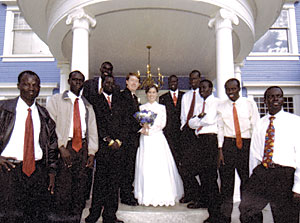
PHOTO COURTESY OF LAURA CONOVER
|
|
By Alexis Blue
Arizona Daily Wildcat
Monday, October 4, 2004
Print this
When UA law student Laura Conover became a volunteer tutor for the Lost Boys of Sudan in 2001, she simply wanted to help them adjust to their new lives in America. But three years later, Conover says she's learned more from them than they have from her.
In summer 2001, Conover, then a Spanish and political science major, was preparing to enter her senior year at the UA when she decided she wanted to volunteer with the Sudanese refugees who had moved to Tucson that year.
Conover said she was overwhelmed by coverage of Sudan's civil war and the Lost Boys in the Arizona Daily Star, and decided she wanted to help the Lost Boys in Tucson by teaching them to ride bikes.
"I had a real desire to try to help," Conover said. "I didn't know how much my life would change."
With the assistance of former UA Honors College adviser Mari Heltne, who was volunteering with the Lost Boys at the time, Conover was introduced to some of the refugees and became the first UA student they met.
"We start to introduce ourselves and they're very excited that I'm a Wildcat, that I'm a real UA student," Conover said.
But when Conover, in a room with 17 refugees, announced her idea to give lessons in bike-riding, she said the response was not what she expected.
"There's a long pause and (one of them) says, "We already ride bikes. You are a U of A student, yeah? ... We need to pass the GED and become college students immediately. You will do that."
Conover said, impressed by their confidence, she agreed on the spot to become their tutor.
After recruiting two of her friends to help, Conover began holding regular Sunday tutoring sessions that focused mainly on reading and writing English, and continued in some form for the next three years.
"She was the first girl we met," said Jok Mabior, a nursing junior who started at the UA in the fall. "She has been really good for us. When we were going to Pima full-time we had a really hard time, but she made it easier, coming every Sunday and helping us."
Peter Ayuen, a political science junior in his first year at the UA, said meeting Conover in 2001 made him realize it wasn't too late too go to college.
"What I said was, 'Wow, I am 22 years old and I didn't even pass through high school, and yet you are 22 and you are at the university,'" Ayuen said. "And she told me, 'If you want, you can still go whenever you want.'"
Conover, now a third-year law student at the UA, said watching the first 10 refugees graduate from Pima Community College over the past two years was incredible.
"I was so proud of them," Conover said. "They've accomplished so much in such little time, after having everything ripped from them."
Laura said as time has passed and the men's reading and writing has improved, her visits with them have became more social.
"Sometimes they were already done with their weekly homework and they just wanted to hang out, and it was a great time to practice English and ask a million-and-one bizarre American questions," Conover said.
With 14 of the refugees now enrolled full-time at the UA, Conover said she sees less of them than she used to, but she still makes an effort to visit them every weekend.
"It's starting to change because their lives are changing so much right now," Conover said. "It's a little bittersweet."
Khoor Lukuach Malual, a mathematics and electrical engineering junior, said Conover has been more than a friend to him and the others.
"A good friend is one who actually comes to see you sometime and say, 'How are you?' That is the kind of friend we need," he said.
Conover has also taken them out to restaurants, stores and places like bowling alleys and roller rinks.
"It was really a good thing to meet Laura," Ayuen said. "We did not know if we could meet people like that before."
Conover said when she first decided to volunteer with the Lost Boys, she thought it would be a short-term commitment.
"I just thought it was going to be teaching them to ride bikes a few Saturdays," she said. "It's changed my life."
Now, Laura said she feels like the men are a part of her family.
"They have so much to share because they are all brothers, they all come from the same tribe and it doesn't matter blood line," Conover said.
"They're all brothers and that's the way they viewed us, like sisters and brothers eventually. That was the gift that they gave us was that suddenly we had all these new brothers."
In February, Conover invited the men to her wedding where they surprised her by performing a traditional Dinka wedding blessing and singing and dancing at the ceremony.
"She's our best friend and she's getting married, and we need to show the love we had," Malual said.
"It's something I'll never forget," Conover said.
Conover said her relationship with the Lost Boys of Sudan has given her a new appreciation for life.
"It's a friendship like I've never known," she said. "It represents something a little bit magical that they are even here. They see every day as extra, and you can't help but pick up some of that good, contagious life quality."
